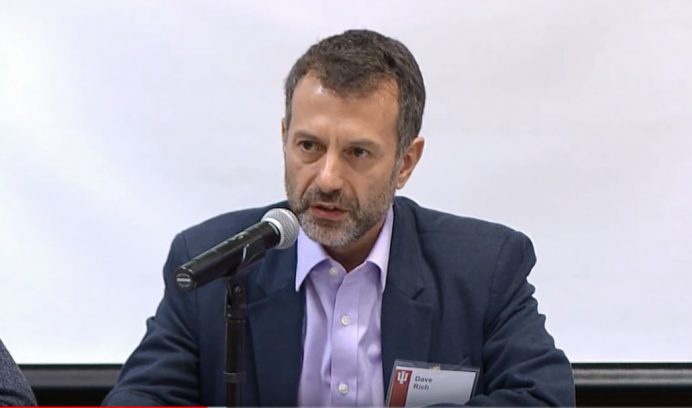On 7 January 2021 The Guardian published a letter from eight lawyers who claimed that the IHRA definition of antisemitism, which the UK government has instructed UK universities to adopt, undermines free expression. The signatories also claimed that examples included in the IHRA definition have been ‘widely used to suppress or avoid criticism of the state of Israel.’ Dave Rich, Director of Policy at the Community Security Trust and a leading expert on left-wing antisemitism, argues that the letter rests on a ‘misrepresentation of what the definition says and does’, ‘unevidenced claims’ about its impact, and confusions about its legal status and power. The IHRA definition, he contends, offers universities ‘a modest, sensible and practical guide to antisemitism that would help Jewish students to play a full part in campus life’.
The campaign against the International Holocaust Remembrance Alliance (IHRA) working definition of antisemitism has been running for long enough that it is now possible to identify its common themes. These include repeated misrepresentation of what the definition does, and does not, say about Israel and antisemitism; unevidenced claims about the definition’s alleged impact on free speech; confusion of its legal status and power; and an appeal to authority by quoting others from within this same campaign.
A letter in last week’s Guardian (where else?), signed by eight experienced lawyers, is a helpful example of how this works. It opens with the claim that, ‘The legally entrenched right to free expression is being undermined by an internally incoherent “non-legally binding working definition” of antisemitism.’ The letter then cites the Universal Declaration of Human Rights, the Human Rights Act 1998 and the Education Act 1986 before noting that the IHRA definition ‘has no legislative or other authority in international or domestic law.’
Given that this is the case, it is hard to see how a non-legal definition with no legal authority could undermine legally-guaranteed rights to free expression and academic freedom. Most universities understand this, even if these eight lawyers don’t: the University of Oxford, in announcing its recent adoption of the IHRA definition, stated that, ‘The IHRA definition does not affect the legal definition of racial discrimination, so does not change our approach to meeting our legal duties and responsibilities.’
There are other legal restrictions on free expression which these lawyers did not mention in their letter, including the Public Order Act, the Equality Act, the Protection from Harassment Act, the Malicious Communications Act and so on. These all limit free speech, including at universities, but the letter’s signatories do not seem troubled by this. Instead, a definition that even they concede is ‘non-legally binding’ is, apparently, such a grave threat to free expression that it is worth a letter to the Guardian. Why is this the case?
The answer lies in their misrepresentation of what the definition says and does. They claim, as others have before them, that ‘the majority’ of the IHRA definition’s ‘illustrative examples’ of potentially antisemitic speech ‘do not refer to Jews as such, but to Israel. They have been widely used to suppress or avoid criticism of the state of Israel.’ The implication is that the IHRA definition is more concerned with, or directed against, anti-Israel speech than anti-Jewish speech.
This is simply not true: of the eleven ‘illustrative examples’ of potentially antisemitic speech listed in the IHRA definition, nine explicitly mention Jews or the Jewish people (seven mention Israel, of which five mention both Jews and Israel). Given that this is the case, the claim that ‘The majority of these examples do not refer to Jews as such, but to Israel’ is so obviously untrue that it is difficult to understand how a group of such experienced lawyers can put their names to it. Either they did not read the definition before writing to theGuardian about it, or they read it but decided to ignore what it actually says. Perhaps they hoped that the qualifier ‘as such’ would magically change the meaning of the word ‘Jews’ that precedes it. I’m not sure which of those three explanations would be the most damning.
The examples that mention both Jews and Israel include ‘Accusing the Jews as a people, or Israel as a state, of inventing or exaggerating the Holocaust’; ‘Holding Jews collectively responsible for actions of the state of Israel’; ‘Using the symbols and images associated with classic antisemitism (e.g., claims of Jews killing Jesus or blood libel) to characterize Israel or Israelis’; or ‘Accusing Jewish citizens of being more loyal to Israel, or to the alleged priorities of Jews worldwide, than to the interests of their own nations.’ Do the signatories of this letter really intend to claim that these examples suppress legitimate, non-antisemitic criticism of the State of Israel? If that is the case, let them try. They will struggle to persuade many people of their argument.
More likely is that they object to the examples stating that it ‘could’ be antisemitic to deny ‘the Jewish people their right to self-determination, e.g., by claiming that the existence of a State of Israel is a racist endeavour’; and ‘Applying double standards by requiring of it a behaviour not expected or demanded of any other democratic nation’; and perhaps the one that says ‘Drawing comparisons of contemporary Israeli policy to that of the Nazis’ is antisemitic. The IHRA definition says that these examples ‘could’ be antisemitic; implying that sometimes they could not be. Perhaps the lawyers who wrote this letter believe that these examples of anti-Israel speech could never, in any circumstances or context, be evidence of antisemitism. Again, if that is what they believe, let them argue the point. But they should represent the definition fairly and accurately in doing so.
Immediately following their misrepresentation of the content of the definition comes their equally unsubstantiated claim of its impact. The Israel-focused examples in the definition, they write, ‘have been widely used to suppress or avoid criticism of the state of Israel.’ Widely used? You would be forgiven for treating the suggestion that criticism of Israel is widely suppressed, either in our universities or elsewhere, as a laughable fantasy. One example that is sometimes put forward by people who claim otherwise – and it appears to be the only one from a British university – is the cancellation of a meeting at the University of Central Lancashire in 2017 that was part of that year’s Israel Apartheid Week. But one swallow does not make a summer, and anti-Israel events still take place at British universities on a regular basis, including but not limited to Israel Apartheid Week, even during a pandemic, in the years since that single meeting was cancelled. So much for widespread suppression.
Much of the current anger in academia over the IHRA definition stems from the fact that the secretary of state for education in a Conservative government, Gavin Williamson, is trying to force universities to adopt it. There is a respectable argument to be made about the autonomy of universities in this respect; but those who write in opposition to Williamson’s efforts rarely limit themselves to that point of principle. Instead, this letter, like the article it cites by Professor David Feldman in the same newspaper last month, ranges much further than an objection to ministerial overreach and extends firmly into a hostile critique of the definition itself.
Meanwhile, antisemitic incidents at British universities are at record levels and Jewish students, as represented by their national Union and local Societies, are asking their institutions to take stronger action against it. The IHRA definition, understood and used correctly, can be a useful tool in this work: the European Commission’s handbook on practical uses of the definition recommends its use in universities ‘to identify and intervene against antisemitism’ and ‘to create safer places for Jewish students, as problems can be identified and better solved at an early stage’. This is what the adoption of the IHRA definition by universities would actually involve: a modest and sensible use of a practical guide to antisemitism that would help Jewish students to play a full part in campus life. Is that really something worth opposing in the letters page of the Guardian?






































https://onthedarkside410122300.wordpress.com/2021/01/07/eight-authorities-on-antisemitism-pass-the-sick-bucket/
The lowdown on the 8 lawyers ….
Why “could ” ….” by claiming that the existence of a State of Israel is a racist endeavor.” be seen as anti-Semitism ?
Jonathan Gray, if you claim that Israel is a “uniquely racist” endeavor you are either ignorant or there is something wrong with you. Virtually all states were created by wars, conquests, massacres, and so on. If Israel only deemed illegitimate or racist because of the circumstances that accompanied its creation, there is something wrong.
There used to be a “decent anti-Zionism” a long time ago (people like Isaac Deutscher were the embodiment of this kind of anti-Zionism). But unfortunately, since the 1950s, Soviet propaganda began to Nazify Israel. The European far-left began to rehash these tropes in the mid/late 1960s.
If you posit that it was wrong to establish a Jewish state in a land already inhabited by another people, that’s fine. The founding fathers of Israel responded to this argument by arguing that leaving the Jewish people homeless is a greater injustice than depriving the Palestinians of a part of their land. Hence, Chaim Weizmann referred to the partition of the land as “the line of the least injustice”. Once again, one can reject this argument. One can argue that the territorial integrity of Palestine takes precedence over the Jewish people’s right to self-determination.
But when the far-left begins to say that Zionism is based on the idea that Jews are superior to non-Jews; that the Jews are a “fake people”; that the Zionist movement helped the Nazis to exterminate the Jews (so as to make the Europeans feel guilty for not saving them after the Holocaust); that Israel is perpetrating against the Palestinians; that Zionists rules the world (especially the US); that Zionists control the media; that Zionists silence anyone who wants to reveal the fact that Jews lead slave trade; that Zionists make sure that the Western media or the cultural industry talks about the Holocaust and no other atrocity without a shred of evidence; that Zionists send humanitarian aid to Haiti merely for the sake of harvesting the organs of Haitian children; if you impose a litmus test on Jews in universities and demand that they publicly condemn Zionism otherwise they can’t be involved with the student body), there is something wrong with you.
Many anti-Zionists to not that far. They merely call for the dismantling of Israel.
First, this is illegal. Israel has the right to exist under UN Security Council Resolutions. Its right to exist was also reiterated by the International Court of Justice in 2004 (when it declared that the occupation of the West Bank and the separation wall were illegal).
Second, the Palestinians can achieve most of their goals without (including the return of refugees) without the dismantling of refugees) with the establishment of a confederation. In a confederation, both states can even decide to establish a joint foreign policy, which would give the confederations all the trappings of a single country, although both states would remain sovereign, as they would have veto power when it comes to foreign policy.
Strangely enough, BDS rejects this solution. It only wants to dismantle the state of Israel.
No state in the face of the Earth is slated for dismantlement because of a so-called original sin. I know Peter Beinart and others have tried to justify this double-standard by giving the example of the apartheid regime in South Africa or the former USSR that were both dismantled, but these examples are misleading.
The South African apartheid regime was illegal, as it was based on the rule of a minority. As for the collapse of the Soviet Union, it did not bring about the end of Russian self-determination. The collapse of the USSR merely shrank the size of the territory under Russian control. BDS and radical anti-Zionists do not want to “shrink Israel” (this is what liberal Zionists want). BDS and the rest of the anti-Zionist far-left want the end of Israel.
I’m not comfortable accusing anyone of being an antisemite if he does not identify as a Jew-hater. I’m just physically unable to do so. But you ought to acknowledge that 1) denying the right of the Jews to identify as a people, 2) calling for the destruction of Israel, and 3) using all sorts of irrational and defamatory accusations and conspiracy theories against Israel and Zionism that are reminiscent of old antisemitic stereotypes, is troubling.
In my MA thesis, I interviewed former anti-Zionist Jews who were involved with the far-left in the late 1960s/1970s (mostly Trotskyists and Maoists). Most of them are not proud of this past but they told me that the main reason they came to embrace a radical form of anti-Zionism has more to do with their (former) third-worldist outlook than Jew-hatred. In other words, they saw Jews as “privileged whites” and non-Whites as an extension of the working class. The Palestinians could do and say whatever they wanted, they would never dare to say oppose any of their choices, as you don’t say no to the Proletariat.
They also told me that although they never denied their Jewish roots, they were uncomfortable with the concept of Jewish peoplehood, as it makes no clear-cut distinction between religion and peoplehood (there are other peoples as well, who do not operate a clear-cut separation between religion and peoplehood but strangely enough, this is illegitimate only when it comes to the Jews).
But whether the far-left gets hysterical about Israel for third-worldist reasons or sheer Jew-hatred, it makes no difference at all. If you fail to treat the Jews the way you treat any other human group, there is something wrong with you. I don’t care about the word antisemitism. No one can deny that the far-left is more severe toward Jews than any other group. This is morally wrong.